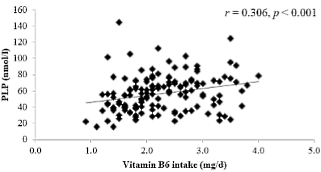|
Definition: "An ergogenic aid is any substance or phenomenon that enhances performance "
|
|
||||||||
31.03.2017 |
|
|
Vitamin B6 helps over 60s stay mentally fit
Copious intake of vitamin B6 can considerably reduce the chance of cognitive decline in the over 60s, write nutritionists at the University of Ulster in Northern Ireland in Nutrients.
Study
After four years the researchers got in touch with the participants and carried out the Mini-Mental State Examination again.
Results
The same was true for the concentration of the vitamin B6 metabolite pyridoxal-5-phosphate [PLP] in the participants' blood: the lower this was, the greater the likelihood of mental decline.


The researchers also found a direct relationship between the intake of vitamin B6 via food and the concentration of PLP in the participants' blood. More vitamin B6 in the diet was accompanied by a higher level of PLP.
At an intake of 0.9-1.4 mg vitamin B6, the chance of cognitive decline was higher by a factor 3.48 than at a higher intake. This raises the question of whether the current vitamin B6 guideline is not on the low side. Nutritionists in Europe advise a daily intake of 1.5 mg vitamin B6 per day.
Conclusion
"These findings are important because optimising vitamin B6 status in older people, through the use of fortified foods or supplements, may have a positive impact on cognition in ageing."
"Further research in this area in the form of well-designed randomised controlled trials targeted at populations with sub-optimal status are required in order to confirm a cause and effect relationship between B-vitamin status and cognitive health in ageing."
Source:
More:
Archives: |
|


